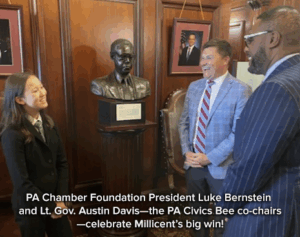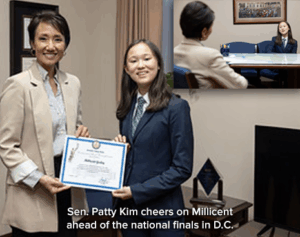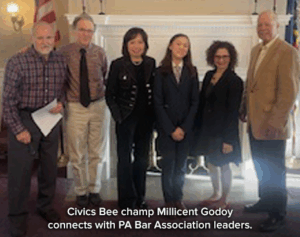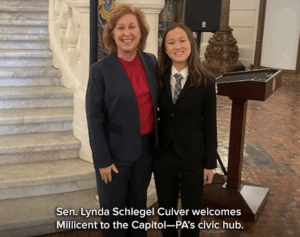 This past June, the HUB-Robeson Center at Penn State University was abuzz with the excitement of young leaders, as middle school students from across Pennsylvania gathered for the National Civics Bee® Pennsylvania State Finals. These remarkable young people had already distinguished themselves as regional champions, each earning their place by presenting original, civics-driven ideas for improving their communities at local chamber-hosted bees earlier in the year.
This past June, the HUB-Robeson Center at Penn State University was abuzz with the excitement of young leaders, as middle school students from across Pennsylvania gathered for the National Civics Bee® Pennsylvania State Finals. These remarkable young people had already distinguished themselves as regional champions, each earning their place by presenting original, civics-driven ideas for improving their communities at local chamber-hosted bees earlier in the year.
The Pennsylvania State Final challenged these students with two rigorous multiple-choice rounds, testing their knowledge of the nation’s governmental structure, landmark court cases, and more. From this talented group, the top five advanced to deliver oral presentations of the ideas that had propelled them to the state stage, impressing a panel of judges with their vision and passion, and ability to answer questions about the impact of their plans on their communities.
The day’s overall winner was Millicent Godoy, an 8th grader from the Harrisburg region.
Millicent will represent Pennsylvania at the National Championship in Washington, D.C., on November 11, 2025. The PA Chamber was thrilled to sit down with Millicent to discuss her journey to the top, what inspired her to enter the Bee, her approach to preparing for the upcoming championship, and her aspirations for future civic engagement.
The National Civics Bee® is now in its third year and was founded by the U.S. Chamber Foundation to reverse a national decline in civics knowledge and raise a new generation of informed, engaged, and civil leaders. Who or what sparked YOUR interest in civics and engage in the 2025 National Civics Bee®?
Who or what sparked YOUR interest in civics and engage in the 2025 National Civics Bee®?
When my history teacher introduced the National Civics Bee® to me, there was no doubt in my mind that it was something I wanted to do. I was immediately brainstorming essay ideas, and as I learned more about the competition, my excitement only grew.
I have long had a passion for American government and history. Throughout middle school, I enjoyed independently studying topics like the basics of constitutional law, the role of journalism in politics, and the interpretation of the First Amendment. When I learned about the competition, I was just beginning to grow my interest in public speaking. I had joined my school’s Youth and Government club, where my peers inspired me to discover my voice through debate and speechwriting.
The National Civics Bee® combined my two evolving interests—American government and passionate dialogue—into one.
 The questions asked during the National Civics Bee® are challenging – to put it mildly! What did you do to prepare for the Bee during the regional and state rounds? What are you doing to get ready for Nationals, and how does it feel to be representing Pennsylvania and know we’re all rooting for you?
The questions asked during the National Civics Bee® are challenging – to put it mildly! What did you do to prepare for the Bee during the regional and state rounds? What are you doing to get ready for Nationals, and how does it feel to be representing Pennsylvania and know we’re all rooting for you?
I feel incredibly honored to represent the Commonwealth of Pennsylvania at the National Championship. Throughout every round of competition, I have been very lucky to have had the support of my family, friends, teachers, and community.
In preparation for the regional and state competitions, I spent many hours at my local library researching and taking notes on a wide variety of civic topics. As the National Championship approaches, I spend each evening building upon my studies, and each day eagerly discussing my learning with my friends.
For the speech rounds, I have practiced and discussed my ideas with several incredible groups of people, including: lawyers from the PA Bar Association, my middle school teachers, and my friends and family.
 In addition to being rooted in knowledge, the National Civics Bee® is also rooted in developing original, civic-minded ideas for improving hometowns. How important do you feel that concept is to the strength and future of American democracy?
In addition to being rooted in knowledge, the National Civics Bee® is also rooted in developing original, civic-minded ideas for improving hometowns. How important do you feel that concept is to the strength and future of American democracy?
I believe that a focus on civic-minded hometown ideas helps to strengthen our democracy by getting young people involved in the process of change. This focus gives context to the big picture ideas of government by showing what collective action can achieve on a relatable scale.
The strength of a democracy always relies on an active and educated citizenry, and, as is often said, the youth are our future. After seeing the thoughtful ideas my peers have shared throughout the National Civics Bee® , I can confidently say that I feel hopeful about America’s future.
Next year is America’s 250th, and it’s a perfect time for young people to understand how our government works and be committed to using that knowledge to make a difference. How are you hoping to use your wisdom from the National Civics Bee® to empower your fellow students to drive positive change, now and in the future?
One of the most important things that the National Civics Bee® helped me to realize is the power of my voice. Now, I want to use that voice to make a difference.
I want to encourage my peers to believe in the power we have to create change, to ask questions about the world we live in, and to stand up for the issues they care about, no matter the scale.
I like to imagine that I could play some role in getting another person interested in thinking critically about civics—that I could help another person find their voice.
Do you have any plans for civics engagement as you enter high school?
In the next four years, my strongest aspiration is to be accepted into the Senate Page Program. Much like the National Civics Bee® , I fell in love with the Page Program the moment I learned of it. I hope that if accepted into the program, I will be able to add to my education in civics by seeing the legislative process in action.
In addition, I am committed to engage in the civic activities that I believe are the duty of all citizens. I will never cease in learning about our country’s history and current issues, seeking out varying perspectives on both. I will continue to advocate for the change I believe in by calling and writing to my elected representatives, and I will vote in every election once I turn eighteen.
After I graduate high school, I hope to attend college and law school, with the dream of becoming a lawyer specializing in constitutional law.